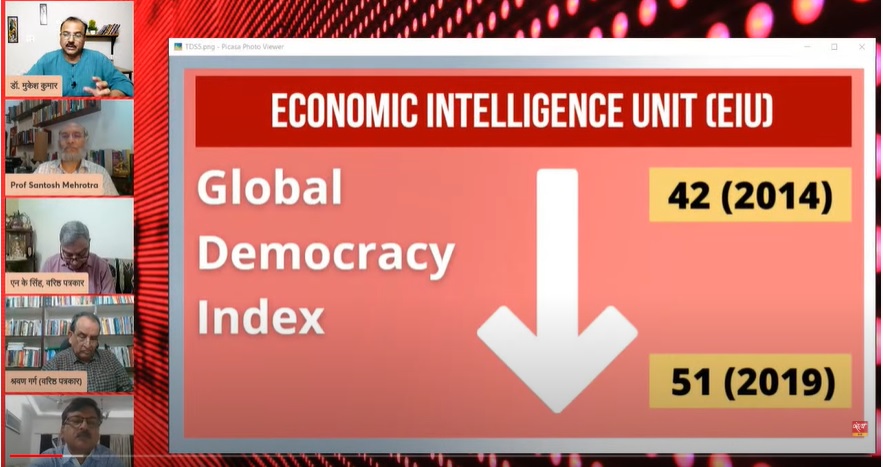India’s WGI ranking might fall, government worried? I WORLD GOVERNANCE INDEX 20/05/2022 https://www.youtube.com/watch?v=H8Wo3vRnmV0 
Why is the Modi government scared of India slipping in the World Bank's Governance Index? What has he done that India's ranking is bound to fall? If this apprehension turns out to be true, how deadly will it be for India? Why is the country collapsing in every international ranking? How responsible is the Modi government for this? What is she doing to deal with this problem? Can these feats improve the situation? Discussions with Dr. Mukesh Kumar include- Prof. Santosh Mehrotra, Shravan Garg, N. K Singh and Harveer Singh
Freedom House Report 2020 https://freedomhouse.org/country/india/freedom-world/2020 rating 71/100 Free
2021 Report: https://freedomhouse.org/country/india/freedom-world/2021 rating 67/100 Paetly Free
2022 Report: https://freedomhouse.org/country/india/freedom-world/2022 rating 66/10 Partly Free
India maintains a robust electoral democracy with a competitive multiparty system at the federal and state levels, though politics are marred by corruption. The constitution guarantees civil liberties including freedom of expression and freedom of religion, but harassment of journalists and other government critics has increased under Prime Minister Narendra Modi and his Hindu nationalist Bharatiya Janata Party (BJP), as have religiously motivated attacks against non-Hindus. Certain minority groups—notably Muslims, scheduled castes (Dalits), and scheduled tribes (Adivasis)—remain economically and socially marginalized despite general legal equality and, in some cases, affirmative-action programs.
2021 Country Reports on Human Rights Practices: India https://www.state.gov/reports/2021-country-reports-on-human-rights-practices/india/ Significant human rights issues included credible reports of: unlawful and arbitrary killings, including extrajudicial killings by the government or its agents; torture and cases of cruel, inhuman, or degrading treatment or punishment by police and prison officials; harsh and life-threatening prison conditions; arbitrary arrest and detention by government authorities; political prisoners or detainees; arbitrary or unlawful interference with privacy; restrictions on free expression and media, including violence, threats of violence, or unjustified arrests or prosecutions against journalists, use of criminal libel laws to prosecute social media speech; restrictions on internet freedom; overly restrictive laws on the organization, funding, or operations of nongovernmental organizations and civil society organizations; refoulement of refugees; serious government corruption; government harassment of domestic and international human rights organizations; lack of investigation of and accountability for gender-based violence; crimes involving violence and discrimination targeting members of minority groups based on religious affiliation, social status or sexual orientation or gender identity; and forced and compulsory labor, including child labor and bonded labor.
Despite government efforts to address abuses and corruption, a lack of accountability for official misconduct persisted at all levels of government, contributing to widespread impunity. Investigations and prosecutions of individual cases took place, but lax enforcement, a shortage of trained police officers, and an overburdened and underresourced court system contributed to a low number of convictions.
Terrorists in Jammu and Kashmir, northeastern states, and Maoist terrorism-affected areas committed serious abuses, including killings and torture of armed forces personnel, police, government officials, and civilians, kidnapping, and recruitment and use of child soldiers.
